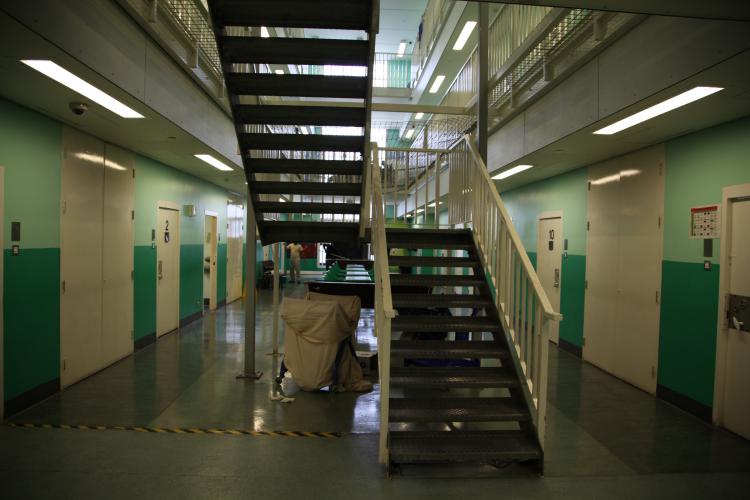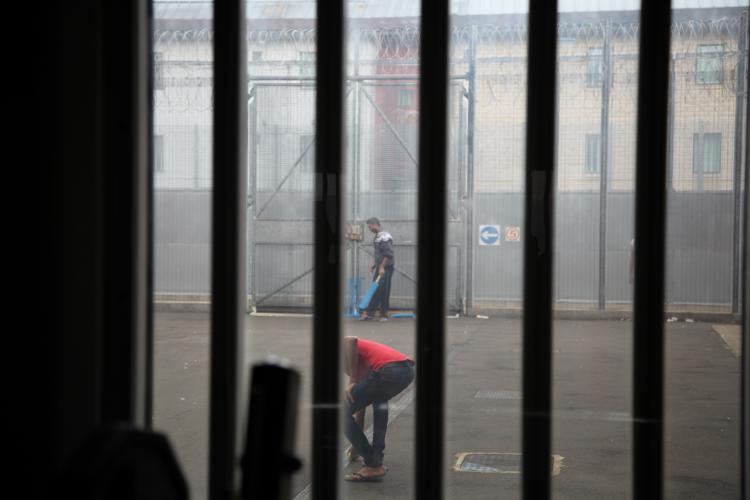Post by Mary Bosworth, Director of Border Criminologies. Mary is on Twitter @MFBosworth. This is the tenth instalment of Border Criminologies’ themed series on 'Immigration Detention in an Era of Mass Mobility' organised by Mary Bosworth.
We know very little about what it is like to work in an immigration detention centre. Most of the small body of academic literature has, understandably enough, been focused on detainees. However, as we know from other sites of confinement, how staff do their job, and their perceptions of those they guard, are crucial to how institutions work. For prison scholars, for example, such matters are determining factors of institutional legitimacy.
Whereas prison accounts emphasize the importance of building relationships and encouraging fair and transparent dealings with prisoners, it is unclear whether such matters function in the same way in detention. Not only are meaningful relationships hard to forge with a rapidly changing population not all of whom speak English fluently, but the goal itself, which rests on mutual recognition, is drawn into question by the logic of deportation that underpins detention. Similarly, the authority of custodial staff is unclear in an environment in which the main decision-makers – the immigration case owners – are elsewhere.

One of the central assumptions of qualitative institutional studies is that studying the internal life world of a carceral institutions illuminates wider questions about their purpose and legitimacy. What prison is like, in other words, tells us something about what it’s for. As I have written about before, detention centres do not fit easily into this frame of analysis. They are neither bounded worlds, nor are their members part of a shared community, at least not of the community based on citizenship, which liberal political philosophy tends to assume.
Instead, IRCs are liminal spaces. On the one hand, sites of penal harm in their own right, they are also often experienced and referred to as staging posts, ambiguous sites before the real action of deportation, removal or release occurs. The rules and legal framework that govern and justify them institutionalize differential treatment based on citizenship. For those subject to such rules, it doesn’t matter how fairly or transparently they are applied, they never feel fair.
While officers expend considerable effort trying to fill this legitimacy gap, they are, and can only ever be, partially successful. The threat of expulsion makes it very difficult to negotiate shared values. Indeed, even though only 50% are removed, detainees are, by virtue of their detention, already cast out as non-members.
Officers may not appreciate such matters explicitly, yet, you can see in their work how they struggle to wield authority and to make sense of their role. Some throw themselves into their job, going above and beyond their roles. Others do the bare minimum. Some are intolerant, others more welcoming.
Everybody, sometimes, is moved by an individual before them. Many ignore detainees as much as possible, assisted by structural factors including privatization, which have stripped staff numbers down to the lowest possible sum, creating a situation where those officers who are left are often exceptionally busy. Legally, in any case, there is usually little custodial staff can do to help, as the immigration case rests with the Home Office.
Although staff get on with their daily routine, wielding power without the usual tenets of legitimacy, their testimonies suggest, can be difficult. Few are particularly positive about their job. Their lack of autonomy and impact, can be particularly difficult, one officer noted at IRC Morton Hall. ‘It's mentally, it's very, very, very challenging,’ she said. ‘Because you don't make a difference to them, really. You make no difference. Whereas with a prisoner, you feel as though you're working towards something, you don't have that kind of satisfaction, really... We make no difference whatsoever. So you don't feel... I wouldn't say you're worthless, because you actually keep them safe until the Home Office decide what's going to do. The actual interventions are not, not in your hands. It's, everything is governed by the Home Office. With a prisoner, a parole... you know, you can contribute with their parole report, things like that. Nothing like that. We're not allowed to fill in bail forms for them or anything. We're not allowed to complete any paperwork. Often they'll ask... you know, we're personal officer to them, and they'll ask that you write a report for them to take to the court. We're not allowed to do that. The Home Office don't allow us to do that.’
Such anxieties about their role within the institutions are compounded by the wider politicization of these sites. On the one hand, staff are often resentful about how they are viewed by critics of detention:
'The biggest struggle I have is when I read stories in the paper or on the web about how horrible we all are as staff, and we do this and we do that’, one officer told me indignantly at IRC Heathrow.
On the other, they are aware that there are many people in the UK with anti-immigrant sentiment, and they don’t always want to talk to them either, this man’s colleague made clear:
‘As soon as you say you work like in immigration removal centre,’ he said, ‘everyone’s got an opinion of them, you know what everyone’s like, “Oh, I’d send all the bastards back,” or whatever, you know what I mean? ‘
Indeed, most officers I have spoken to are tightlipped about their job outside work. They don’t tell many people what they do, preferring to refer to it in general terms, as ‘working in security’, or for ‘immigration’, or simply ‘at the airport’.
There is not a straightforward narrative that explains the work of a detainee custody officer, in part, because expulsion draws into question some of the key values of liberal democracies, even as it is also inherent to them. As a young man told me earnestly in IRC Heathrow:
This is not a happy environment, where you say, 'Good morning.' You know, you come in, and then you get on with your work, and then you're coming home. It's not a happy environment. Because they're, they're stressful, they're locked up. You're locking people in before you go home. So they're not... I mean, they know it's not your fault; you're just doing your job. But then it leaves a little mark in your head, you know. There's a negativity going on there.
No matter what pains detainees or staff express, however, IRCs are in vigorous health. Authority that is unsecured in shared values may be difficult and painful to wield, but it does not crumble. As the officer from Morton Hall observed: at the end of the day, we lock up three hundred and eighty men who don't want to be locked up. Every night they go to their room and we lock them in.

Conclusion
I am still thinking through the implications of these kinds of testimonies. There is an intellectual task here, to try to understand in greater detail how power and authority work in these sites. This is, also, an empirical question. Why do detainees obey the rules? What keeps them from resisting more?
Methodologically, is it possible to scale up this kind of exploratory work? What else might we focus on in thinking about research with officers?
Finally, and this is to try at least for some way forward, I think it is important to return to reflect more on emotions and affect. While it is true that detention is a political choice, facilitated by a legal regime, it is made and remade at the local level in banal, everyday ways by staff and officers.
Our job is to remind everyone; to keep listening and illuminating; to add in the emotions; to point out that power is not just about process, that liberal democracies fail whole groups and that some practices or institutions can’t be ‘fixed’, but must be altogether abandoned. In this task, staff may be unlikely allies, or at least provide some fodder for us to build a critique. As a senior member of staff pointed out to me when I asked about how she coped with her job, ‘There's no way you can switch off one hundred percent; no human can. If you say you can, you're absolutely lying.’
Authority, in other words, maybe can work without legitimacy, but only at a cost. The question remains then, how much or for how long, can that cost be borne?
Any comments about this post? Get in touch with us! Send us an email, or post a comment here or on Facebook. You can also tweet us.
__________
How to cite this blog post (Harvard style)
Bosworth, M. (2017) Affect and Authority in Immigration Detention. Available at: https://www.law.ox.ac.uk/research-subject-groups/centre-criminology/centreborder-criminologies/blog/2017/06/affect-and (Accessed [date])
Share:








